P.G. Wodehouse in his Own Words Read online
Page 3
(‘Jeeves Makes an Omelette’ from A Few Quick Ones)
‘If I had to start my life again, Jeeves, I would start it as an orphan without any aunts. Don’t they put aunts in Turkey in sacks and drop them in the Bosphorus?’
‘Odalisques, sir, I understand. Not aunts.’ ‘Well, why not aunts? Look at the trouble they cause in the world. I tell you, Jeeves … behind every poor, innocent, harmless blighter who is going down for the third time in the soup, you will find, if you look carefully enough, the aunt who shoved him into it.’
(The Code of the Woosters)
His vision of Aunts en masse is of ‘Aunt calling to Aunt like mastodons bellowing across primeval swamps’ but most of his personal soup is whipped up by two particular Aunts – the Good Witch (Aunt Dahlia) and the Wicked Witch (Aunt Agatha).
‘There came from without the hoof-beats of a galloping relative and Aunt Dahlia whizzed in’ (The Code of the Woosters). She is described as having a somewhat florid complexion. ‘Even at normal times [her] map tended a little towards the crushed strawberry’ but now ‘she looked like a tomato struggling for self-expression’ (Right Ho, Jeeves). She ‘has a carrying voice … If all other sources of income failed, she could make a good living calling the cattle home across the Sands of Dee’ (Very Good, Jeeves). ‘I believe that Aunt Dahlia in her prime could lift fellow members of the Quorn and Pitchley out of their saddles with a single yip, though separated from them by two ploughed fields and a spinney’ (Jeeves in the Offing). As for her laugh – ‘she guffawed more liberally than I had ever heard a woman guffaw. If there had been an aisle, she would have rolled in it … She was giving the impression of a hyena which had just heard a good one from another hyena.’ (Much Obliged, Jeeves).
Bertie was known to cower before her ‘like a wet sock’ and he was by no means in a minority of one.
‘[She] can turn in a flash into a carbon copy of a Duchess of the old school reducing an underling to a spot of grease, and what is so remarkable is that she doesn’t have to use a lorgnette, just does it all with the power of the human eye.’
(Much Obliged, Jeeves)
And this is his favourite aunt!
‘The whole trouble is due to your blasted aunt,’ said young Bingo.
‘Which blasted aunt? Specify, old thing, I have so many.’
‘Mrs Travers.’
‘Oh, no, dash it, old man,’ I protested. ‘She’s the only decent aunt I’ve got …’
Even more formidable looms her sister, Aunt Agatha (‘who eats broken bottles and wears barbed wire next to the skin’):
About the only advantage of having an aunt like [Aunt Agatha] is that it makes one travel, thus broadening the mind and enabling one to see new faces.
(Joy in the Morning)
[Aunt Agatha’s] demeanour was now rather like that of one who, picking daisies on the railway, has just caught the down express in the small of the back.
(‘Pearls Mean Tears’ from The Inimitable Jeeves)
Aunt Agatha is like an elephant – not so much to look at, for in appearance she resembles more a well-bred vulture – but because she never forgets.
(Joy in the Morning)
I suddenly observed … a striking portrait of Aunt Agatha, from the waist upwards … It caught my eye and halted me in my tracks as though I had run into a lamp-post. It was the work of one of those artists who reveal the soul of the sitter, and it had revealed so much of Aunt Agatha’s soul that for all practical purposes it might have been that danger to traffic in person. Indeed, I came within an ace of saying ‘Oh, hullo!’ at the same moment when I could have sworn it said ‘Bertie!’ in that compelling voice which had so often rung in my ears and caused me to curl up in a ball in the hope that a meek subservience would enable me to get off lightly.
(Joy in the Morning)
Aunt Agatha is one of those strong-minded women. She has an eye like a man-eating fish … My experience is that when Aunt Agatha wants you to do a thing you do it, or else you find yourself wondering why those fellows in the olden days made such a fuss when they had trouble with the Spanish inquisition.
When I was a kid at school she was always able to turn me inside out with a single glance … There’s about five-foot-nine of Aunt Agatha, topped off with a beaky nose, an eagle eye and lots of grey hair, and the general effect is pretty formidable.
(‘Aunt Agatha Speaks Her Mind’ from The Inimitable Jeeves)
Ironically, although he depicts her as the demonic blister on the Wooster heel, Aunt Agatha merely wants him to toe the line by marrying suitably, working for a living and generally adding up to something. It is Dahlia not Agatha who represents the greater threat to Bertie’s well-being by continually dragooning him into stealing cow creamers and committing sundry acts of petty larceny.
It is bad to be trapped in a den of slavering aunts, lashing their tails and glaring at you out of their red eyes.
(The Mating Season)
On the whole, in the battle to the death between ‘Aunt’ and ‘Nephew’ it is hard not to conclude that Wodehouse had the last word.
* * * *
Uncles, on the other hand, are more sympathetic, mainly because – unlike Aunts – they are gentlemen.
The avuncular ideal is undoubtedly Frederick, Lord Ickenham who ‘still retained, together with a juvenile waistline, the bright enthusiasms and the fresh, unspoiled mental outlook of a slightly inebriated undergraduate’ … ‘Though well stricken in years, the old blister becomes on these occasions as young as he feels, which seems to be about twenty-two.’ His face also had ‘a lurking gleam such as one might discern in the eye of a small boy who has been left alone in the house and knows where the key of the jam cupboard is …’ (Uncle Dynamite).
The ideal Uncle, in pristine condition, is a close approximation to a perpetual child who happens to have picked up a few interesting habits along the way …
My uncle George discovered that alcohol was a food well in advance of modern medical thought.
(‘The Delayed Exit of Claude and Eustace’ from The Inimitable Jeeves)
Lord Ickenham … folded the girl in a warm embrace. It seemed to Pongo, not for the first time, that this man went out of his way to kiss girls.
(Uncle Fred in the Springtime)
… rarely, if ever, are they an aesthetic adornment …
Uncle Tom always looked a bit like a pterodactyl with a secret sorrow.
(Right Ho, Jeeves)
… while Uncle Alaric occupied another perch in the same aviary …
Few coots could have had less hair … and any walrus would have been proud to possess the moustache at which he was puffing.
(Uncle Fred in the Springtime)
Of paramount importance to the young man about town – in the world according to Wodehouse – was the ability to turn like a worm and sting like a scorpion when an Uncle had gone too far, if you follow me …
‘I would just like to say this. You are without exception the worst tick and bounder that ever got fatty degeneration of the heart through half a century of gorging food and swilling wine wrenched from the lips of a starving proletariat. You make me sick. You poison the air. Good-bye, Uncle Alaric,’ said Ricky, drawing away rather ostentatiously. ‘I think that we had better terminate this interview, or I may become brusque.’
(Uncle Fred in the Springtime)
* * * *
Wodehouse was never short of the odd real-life brother or two and relations appear to have been generally cordial – which is perhaps why brothers make relatively few appearances in his work and, when they do, tend to get a good press.
As for sisters … since he never had one, he felt free to view them both pro and con …
Sisters are a mistake, Clarence. You should have set your face against them at the outset.
(Pigs Have Wings)
‘I am sorry … if my eyes are fishy. The fact has not been called to my attention before.’
‘I suppose you never had any sisters,’ said Sally
. ‘They would have told you.’
(The Adventures of Sally)
*
A strong-willed sister of twelve can establish over a brother of seven a moral ascendancy which lasts a lifetime.
(Uncle Dynamite)
… and learn the fundamentals of what it eventually takes to be an Aunt at the same time. Of course, when they get to be older, the whole business can become somewhat more complicated …
It is a curious law of Nature that the most undeserving brothers always have the best sisters.
(Uneasy Money)
CHAPTER THREE
… Downstairs
Butlers, Gentlemen’s Gentlemen …
and so forth
My mind today is fragrant with memories of kindly footmen and vivacious parlour maids.
One thing I can remember is how fond I was of the various maids who went through the Prince home. It may have given me my liking for the domestic-servant class.
* * * *
One incidental advantage of staying with so many different ‘relations’ was the view it gave Wodehouse of the distinctive Upstairs/Downstairs world of Victorian family life. Once the boys had been passed from hand to hand, they would frequently accompany the current ‘Aunt’ (‘many of them vicars’ wives’) on her social calls ‘to the local Great House’, usually being consigned to the care of the servants ‘below stairs’.
In this subterranean kingdom there was a distinct hierarchy in which the Butler was the unquestioned King. When the Staff duly dined it must have been quite a sight to see the Butler offer his arm to the Housekeeper, before leading in the stately procession in ranking order. All of this the young Wodehouse observed, remembered and eventually resurrected.
If I have a fault as a writer, which is very doubtful, I should say that it was a tendency to devote myself a little too closely to the subject of butlers.
(Louder and Funnier)
The fact is, butlers have always fascinated me. As a child, I lived on the fringe of the butler belt. As a young man, I was a prominent pest at houses where butlers were maintained. And later I employed butlers. So it might be said that I have never gone off the butler standard. For fifty years I have omitted no word or act to keep these supermen in the forefront of public thought … Time, like an ever-rolling stream, bears all its sons away, and even the Edwardian butler has not been immune. He has joined the Great Auk, Mah-Jong and the snows of yesteryear in limbo … The real crusted, vintage butler passed away with Edward the Seventh.
And the vintage Butler could indeed be crusted – not to say crusty:
Suddenly the door opened and there stood an august figure, weighing seventeen stone or so on the hoof, with mauve cheeks, three chins, supercilious lips and bulging gooseberry eyes that raked you with a forbidding stare as if you were something the carrion crow had deposited on the doorstep. ‘Not at all what we have been accustomed to,’ those eyes seem to say.
I was well over thirty before I could convince myself, when paying a social call, that the reason the butler looked at me in that cold and distant way was that it was his normal expression when on duty, and that he did not do it because he suspected that I was over-drawn at the bank, had pressed my trousers under the mattress, and was trying to make last year’s hat do for another season.
(‘Butlers and the Buttled’ from Louder and Funnier)
By the laws of their guild butlers of the Edwardian epoch were sometimes permitted a quick, short smile, provided it was sar donic, but never a guffaw.
Beach, the Butler-in-residence at Blandings Castle, is undoubtedly primus inter pares of the species:
Men of Beach’s build do not leap from seats. He did, however, rise slowly like a hippopotamus emerging from a river bank.
(A Pelican at Blandings)
*
Beach … was a man who had made two chins grow where only one had been before, and his waistcoat swelled like the sail of a racing yacht.
(Galahad at Blandings)
In a Wodehouse Butler, corpulence is definitely de rigeur:
Keggs … looked almost precisely as he had looked a quarter of a century ago. Then he had resembled a Roman emperor who had been doing himself too well on starchy foods. His aspect now was of a somewhat stouter Roman emperor, one who had given up any attempt to watch his calories and liked his potatoes with lots of butter on them.
(Something Fishy)
Taken for all in all, however, ‘Keggs was merely a passive evil, like toothache or a rainy day.’ (‘The Good Angel’ from The Man Upstairs) … while Silversmith (uncle to the inimitable Jeeves) ‘looked like one of those steel engravings of nineteenth-centurystatesmen. He had a large bald head and pale, protruding gooseberry eyes …’ His customary aspect was that of ‘a respectful chunk of dough’ (The Mating Season).
Gooseberries seemed to be in season in the eye department:
[Blizzard] radiated port and popeyed dignity. He had splay feet and three chins, and when he walked his curving waistcoat preceded him like the advance guard of some royal procession.
(‘High Stakes’ from The Heart of a Goof)
*
Oakshott was one of those stout, impressive, ecclesiastical butlers … you would have put him down as a Bishop in mufti or, at the least, a plenipotentiary at one of the better courts.
(‘The Come-Back of Battling Billson’ from Lord Emsworth and Others)
*
Parker … stood in the doorway, trying to look as like a piece of furniture as possible – which is the duty of a good butler.
(The Pothunters)
A vintage Wodehouse Butler of a good year needs no bush and is impossible to fake:
Binstead was one of those young, sprightly butlers, encountering whom one feels that in the deepest and holiest sense they are not butlers at all, but merely glorified footmen.
(Pigs Have Wings)
But even the impassive vintage Butler has emotions which occasionally show through. Beach, that ‘solemn procession of one’, has his own distinctive way of registering disapproval – ‘ice formed on the butler’s upper slopes’. And, when seriously discomfited:
[He] resembled … in his general demeanour one of those unfortunate gentlemen in railway station waiting-rooms who, having injudiciously consented at four-thirty to hold a baby for a strange woman, look at the clock and see that it is now six-fifteen and no relief in sight.
(Heavy Weather)
The Butler – in various incarnations – weaves a dignified thread through seventy years of Wodehouse fiction and never ceases to fascinate him as a social phenomenon in real life:
Any man under thirty years of age who tells you that he is not afraid of an English butler lies.
(‘The Good Angel’ from The Man Upstairs)
To the dramatist the butler is indispensable. Eliminate him and who is to enter rooms at critical moments when, if another word were spoken, the play would end immediately? Who is to fill the gaps by coming in with the tea-things, telegrams, the evening paper, and cocktails? Who is to explain the plot of the farce at the rise of the curtain?
(‘Butlers and the Buttled’ from Louder and Funnier)
It was only in what my biographers will speak of as my second London period – circa 1930 – when I was in the chips and an employer of butlers, that I came to know them well and receive their confidence.
By which time he had made the acquaintance of Jeeves, who was not, strictly speaking, a Butler at all but that infinitely higher being – a valet or gentleman’s gentleman – the gentleman-inquestion, of course, being Bertram Wooster, Esq.
* * * *
Wodehouse was to be questioned incessantly over the years as to the origins of his two most popular characters – of whom more has been written than of any other characters in popular fiction, with the exception of their alter egos – Holmes and Watson.
‘I can’t remember how I got the name Wooster’, he wrote in 1962 to a correspondent of the same name, ‘I think it may have been from a serial in th
e old Captain, where one of the characters was called Worcester. The odd thing is that the Bertie Wooster character started out as Reggie Pepper, and I don’t know why I changed the name.’
The odd thing is that you haven’t a criminal face. It’s a silly fatuous face … you remind me of one of those fellows who do dances with the soubrette in musical comedy.
(Much Obliged, Jeeves)
In ‘Comrade Bingo’ Bertie is described as ‘the tall one with the face like a motor mascot’.
By the time I had written two or three books his character was all clear before me. He’s very vivid to me now. Of course, he’s altered tremendously. When he first began he was very much the sort of stage dude, he gradually became more and more individual … He’s picked up a lot of things from Jeeves.
(Radio Broadcast)
Not least a smattering of ill-digested erudition:
(‘True, in the course of years I have picked up a vocabulary of sorts from Jeeves.’ Bertie admits.)
It is pretty generally recognised in the circles in which he moves that Bertram Wooster is not a man who lightly throws in the towel and admits defeat. Beneath the thingummies of what d’you call it, his head, wind and weather permitting, is as a rule bloody but unbowed, and if the slings and arrows of outrageous fortune want to crush his proud spirit, they have to pull their socks up and make a special effort.

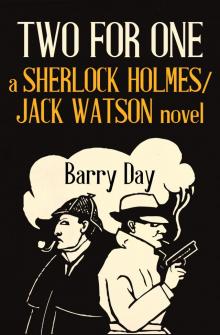 Two for One
Two for One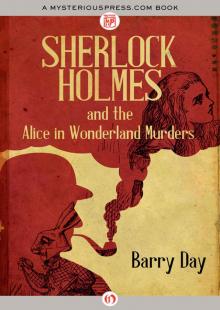 Sherlock Holmes and the Alice in Wonderland Murders
Sherlock Holmes and the Alice in Wonderland Murders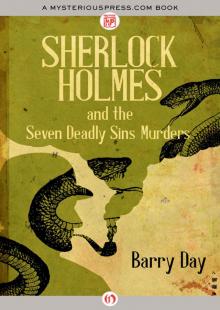 Sherlock Holmes and the Seven Deadly Sins Murders
Sherlock Holmes and the Seven Deadly Sins Murders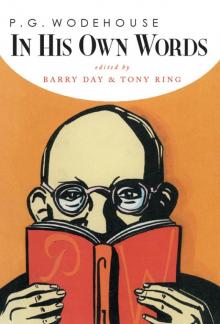 P.G. Wodehouse in his Own Words
P.G. Wodehouse in his Own Words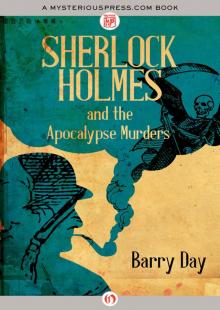 Sherlock Holmes and the Apocalypse Murders
Sherlock Holmes and the Apocalypse Murders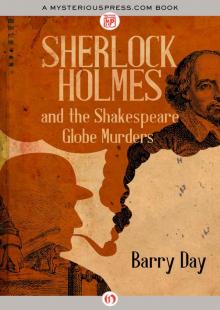 Sherlock Holmes and the Shakespeare Globe Murders
Sherlock Holmes and the Shakespeare Globe Murders